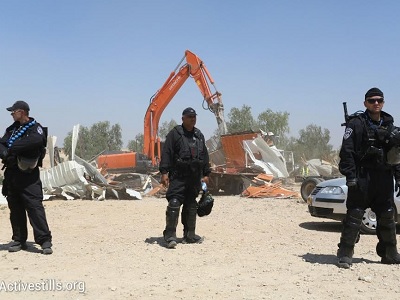
By Bilal Daher
Forty years after the Land Day strike announced by Palestinians in the territories occupied in 1948, the issue of land is still very strongly present today, in 2016, and there is still a conflict ongoing between the Palestinians owners of the land and the Israeli authorities.
After confiscating the overwhelming majority of the Palestinian land in Galilee and the Triangle, the issue of the land now focuses on the Negev area. Twenty-eight years after the Nakba, on March 30, 1976, the Land Day clashes erupted in the aftermath of a large campaign by the Israeli authorities during which they confiscated the overwhelming majority of Palestinian land. This land was agricultural, as well as land reserves that could serve the Palestinians’ population growth.
This land was confiscated in order to build Jewish settlements during the 1950s and 1960s. The largest of these settlements are Illit Nazareth, near Nazareth, and Karmiel near Al-Shaghour.
In addition to this, small settlement towns were established on mountain tops overlooking the surrounding Arab villages. This project aimed to Judaise Galilee, i.e. making its Jewish population larger than its Arab population. However, this goal still has not been achieved.
On the other hand, the project of “Judaising the Negev”, contrary to the project of “Judaising Galilee”, is linked, according to all the plans made by the Israeli government and Zionist organisations, such as Keren Kayemet LeYisrael, Israel’s permanent fund, not only to the confiscation of land, but to the displacement of the Palestinian Bedouins who own the land and to gather them in other villages.
In alignment with these plans, over the past few years, the Israeli government approved plans to establish Jewish towns and “individual farms” in the Negev after its inhabitants are expelled and their buildings demolished.
The Negev Bedouins’ land, that the Israeli authorities want to confiscate, encompasses 38 villages that the Israeli authorities refuse to recognise despite the fact that they existed even before the establishment of Israel and are populated by over 90,000 Negev Bedouins.
Therefore, these unrecognised villages lack all the services that the state is obliged to provide to its citizens, such as linking it to the water and electricity networks, paved roads, and establishing educational institutions and medical clinics, etc. In addition to the land on which the unrecognised villages are established, the Negev also consists of land that the Bedouins and others have planted and other land used for their livestock to graze. The area that the Israeli authorities are trying to confiscate is estimated at about 198,000 acres.
Israel’s policy of failing to recognise the Negev Bedouins’ ownership of their land aims to turn the Bedouins from rightful owners of the land to “criminals” and “invaders”. Based on this policy, the Israeli authorities are demolishing their homes, spraying their crops with pesticides, confiscating their livestock, etc.
However, the truth of the matter is that the Bedouins are historically the rightful owners of the land in the Negev. For hundreds of years, this was an accepted fact, evidenced by the fact that during the British mandate and before the establishment of Israel, the Jews purchased land in the Negev from the Bedouins to build their kibbutzim.
Why has the Israeli government demolished the village of Al-Araqeeb a hundred times, and how does the “government” view the Bedouins? Israeli Prime Minister Benjamin Netanyahu answered this question in July 2010: “We are a nation state, which means that the overall sovereignty of the country is reserved for the Jewish people. […] Today, an international campaign is being waged against the definition of Israel as a Jewish state. I do not want to leave things as is, because we are under attack on this matter. The significance of these attacks is that various elements are liable to demand their own national rights and the rights of a state within the state of Israel – in the Negev, for example, if it becomes a region without a Jewish majority. This happened in the Balkans and constitutes a real threat.”
With the 40th anniversary of Land Day approaching, Israel’s war against its Palestinian Arab “citizens” is still ongoing in order to control their resources. Israel has continued to wage such a war for about 50 years against their brethren in the territories occupied in 1967 in order to seize their resources via their settlement project.
While Netanyahu’s successive governments over the past seven years have brought the conflict back to the period pre-1948 by means of these policies and the other hostile policies they adopted, it is not strange for us to see the Palestinians in ‘48 Palestine as playing an effective role in the current Palestinian movement. Israel is waging a war against all that it Palestinian.




